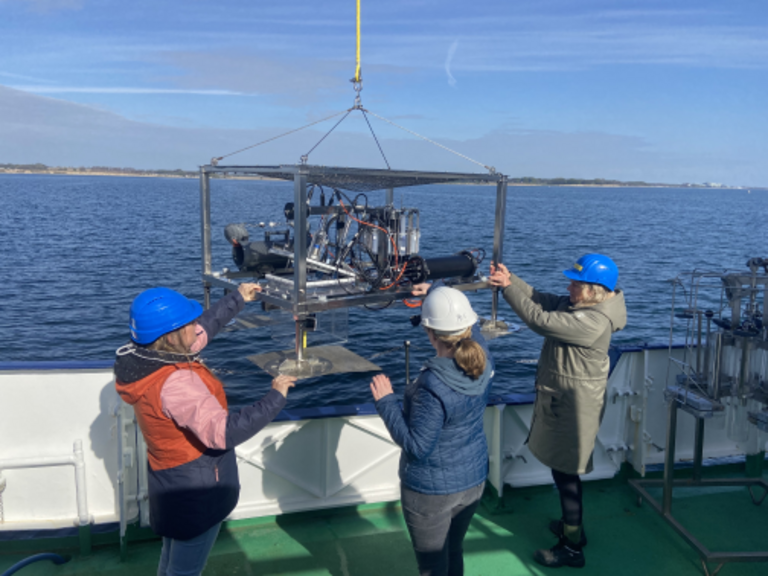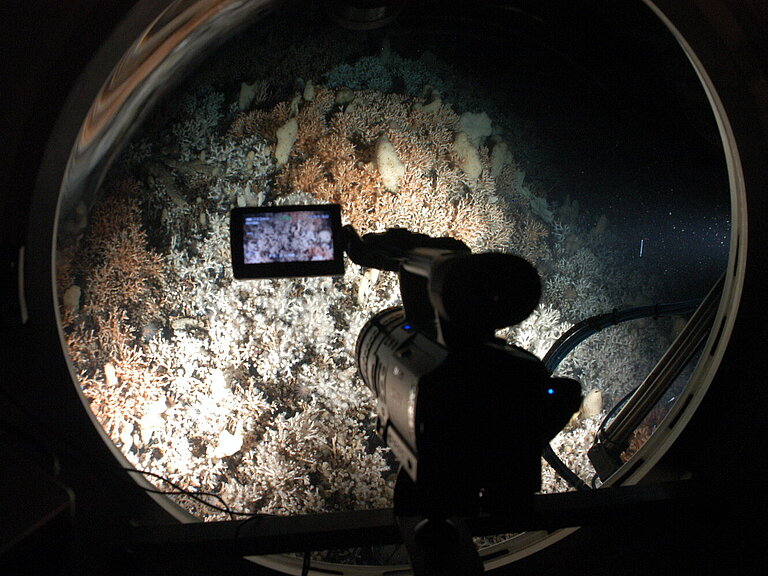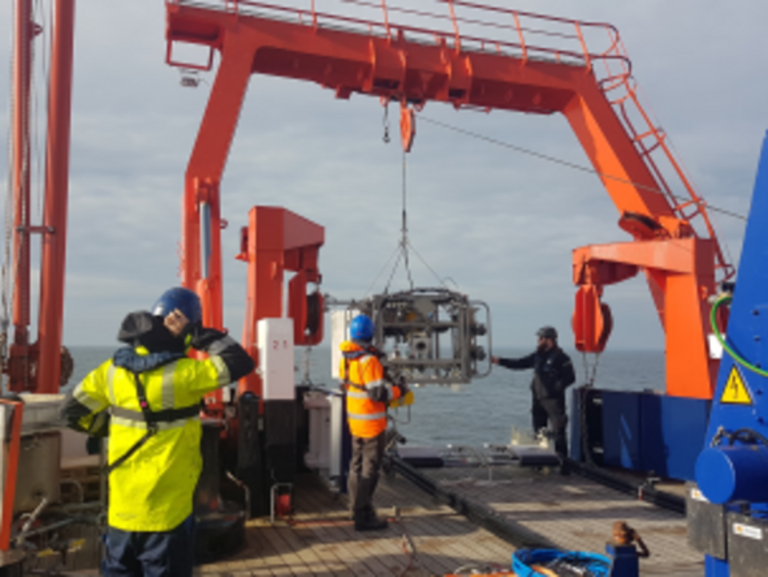Autonomous Robotic Sea-Floor Infrastructure for Bentho-Pelagic Monitoring
Subproject: ARIM-FUEL - Development of a Submarine Fuel Cell
Funding Period: June, 2018 - May, 2021
Funding Body: BMBF, EU
Project Information
Head Scientist: Sascha Flögel
Brachiopods As SEnsitive tracers of gLobal marINe Environment: Insights from alkaline, alkaline Earth metal, and metalloid trace element ratios isotope systems
Funding Period: January, 2015 - December, 2018
Funding Body: EU
Project Information
Head Scientist: Anton Eisenhauer
Boost Applied Munition Detection Through Smart Data Integration and AI Workflows
Funding Period: December, 2019 - November, 2022
Funding Body: EU
Project Information
Head Scientist: Jens Greinert
BICYCLE
Benthic Iron Cycling in Oxygen Minimum Zones and Implications for Ocean Biogeochemistry
Funding Period: August, 2012 - October, 2015
Funding Body: EU
Project Information
Head Scientist: Christian Hensen
Biological Impacts of Ocean Acidification
Funding Period: September, 2009 - November, 2017
Funding Body: BMBF
Project Information
Head Scientist: Ulf Riebesell
Bones4Culture
German-Danish Identity Illuminated Through the Analysis of Cultural Heritage
Funding Period: July, 2011 - June, 2014
Funding Body: EU
Project Information
Head Scientist: Anton Eisenhauer
BOPCATS
Beaufort Offshore Permafrost and Gas Hydrates – Climate Change Impact on Arctic Transgressed Continental Shelves
Funding Period: August, 2019 - July, 2022
Funding Body: DFG
Project Information
Head Scientist: Michael Riedel
CALMARO
Calcification by Marine Organisms
Funding Period: October, 2008 - September, 2012
Funding Body: EU
Project Information
Head Scientist: Nicole Schmidt
Cayman
Illuminating Ultra-Slow Spreading Centres: A Seismic Approach to the Cayman Trough
Funding Period: September, 2019 - August, 2021
Funding Body: EU
Project Information
Head Scientist: Ingo Grevemeyer
China Gas Hydrate
Characterization and Energy Production Strategies of Gas Hydrate Deposits in the North South China Sea
Funding Period: March, 2014 - February, 2017
Funding Body: Helmholtz-Gemeinschaft
Project Information
Head Scientist: Matthias Haeckel
CLAM
Structure and petrophysics of oceanic Crust and Lithosphere, Atlantis Massif. Study of cores from IODP Expedition 357 (CLAM)
Funding Period: December, 2016 - May, 2018
Funding Body: DFG
Project Information
Head Scientist: Jan Hinrich Behrmann
Control of an Operational Mining Path Through an Auto-Adaptive Steering System
Subproject: COMPASS-DRIMP - Producing DTMs and Mn-Nodule Reserve Data Layers for defining the Ideal-Mining-Path. Project partner.
Funding Period: January, 2018 - December, 2020
Funding Body: EU, BMBF
Project Information
Head Scientist: Jens Greinert
DAM Pilot Mission Protected Areas of the Baltic Sea: Effects of the exclusion of mobile bottom-contact fishing in marine protected areas
Funding Period: March, 2020 - February, 2023
Funding Body: BMBF
Project Information
Head Scientist: Stefan Sommer
Deep Quanticams
Visual Deep Sea Mapping and Quantitative Imaging Using Cameras
Funding Period: June, 2019 - May, 2022
Funding Body: DFG
Project Information
Head Scientist: Kevin Köser
Towards SMART Monitoring and Integrated Data Exploration of the Earth System - Implementing the Data
Funding Period: June, 2018 - May, 2021
Funding Body: Helmholtz-Gemeinschaft
Project Information
Head Scientist: Jens Greinert
Do-Stro
The four major Isotopes of Dolomite (C, O, Mg, Ca): Closing the Calcium Isotope (d44/42Ca) Gap
Funding Period: January, 2020 - December, 2022
Funding Body: DFG
Project Information
Head Scientist: Volker Liebetrau
Electroenzymatic CO2 reduction using recombinant CODHs from seafloor habitats recovered via an activity-based screen
Funding Period: February, 2020 - January, 2023
Funding Body: BMBF
Project Information
Head Scientist: Mirjam Perner
Sub-marine CO2 storage: Impact on marine ecosystems
Funding Period: May, 2011 - April, 2015
Funding Body: EU
Project Information
Head Scientist: Klaus Wallmann
Effects of Diagenesis on the Divalent Cation Proxies (Sr/Ca, Mg/Ca) and their Isotope Systems (delta 44/40Ca, delta 88/86Sr, delta 26/24Mg) on biogenic carbonate hardparts
Funding Period: April, 2013 - March, 2016
Funding Body: DFG
Project Information
Head Scientist: Anton Eisenhauer
European Multidisciplinary Seafloor Observation
Funding Period: April, 2008 - September, 2012
Funding Body: EU
Project Information
Head Scientist: Olaf Pfannkuche
Influences of thermodynamic and kinetic factors on the formation and dissolution of calcium phosphates in complex geochemical systems
Funding Period: January, 2016 - December, 2018
Funding Body: DFG
Project Information
Head Scientist: Julyan Oxmann
Environmental Research Infrastructures Providing Shared Solutions for Science and Society
Funding Period: May, 2015 - July, 2019
Funding Body: EU
Project Information
Head Scientist: Arne Körtzinger
FLOWS
Impact of Fluid Circulation in Old Oceanic Lithosphere on the Seismicity of Transform-type Plate Boundaries: New Solutions for Early Seismic Monitoring of Major European Seismogenic Zones
Funding Period: October, 2013 - October, 2017
Funding Body: EU
Project Information
Head Scientist: Christian Hensen
Future Ocean II
Funding Period: November, 2012 - October, 2017
Funding Body: DFG
Project Information
Head Scientist: Martin Visbeck
Gasmigration
Gas Migration and Gas Hydrate Formation in Marine Sediments
Funding Period: December, 2019 - November, 2021
Funding Body: DFG
Project Information
Head Scientist: Klaus Wallmann
HERMIONE
Hotspot Ecosystem Research and Man's Impact on European Seas
Funding Period: April, 2009 - September, 2012
Funding Body: EU
Project Information
Head Scientist: Olaf Pfannkuche
HISEM
A 'High Sensitive Deep Sea Methane Monitoring' System for Underwater Leakage Measurements
Funding Period: October, 2010 - September, 2013
Funding Body: EU, BMBF
Project Information
Head Scientist: Peter Linke
HOSST
Helmholtz Research School Ocean System Science and Technology (HOSST)
Funding Period: June, 2012 - December, 2019
Funding Body: Helmholtz-Gemeinschaft
Project Information
Head Scientist: Wolf-Christian Dullo
HYDROGENASEN
New Hydrogenases from Deep-Sea Hydrothermal Vents
Funding Period: May, 2018 - March, 2021
Funding Body: DFG
Project Information
Head Scientist: Mirjam Perner
In Situ Monitoring of Oxygen Depletion in Hypoxic Ecosystems of Coastal and Open Seas and Land-Locked Water Bodies
Funding Period: April, 2009 - March, 2012
Funding Body: EU
Project Information
Head Scientist: Olaf Pfannkuche
ICONOX
Influence of the Iron Cycle in Continental Margin Sediments on the Nutrient and Oxygen Balance of the Ocean
Funding Period: October, 2016 - September, 2019
Funding Body: DFG
Project Information
Head Scientist: Florian Scholz
ID&S
Isotope Diagnostics & Services
Funding Period: July, 2016 - June, 2018
Funding Body: Helmholtz-Gemeinschaft
Project Information
Head Scientist: Anton Eisenhauer
Jeddah Transect - Biological, Geological, and Geophysical Studies of an Emerging Ocean
Funding Period: July, 2010 - June, 2013
Funding Body: -
Project Information
Head Scientist: Warner Brückmann
Environmental Impacts and Risks of Deep-Sea Mining
Funding Period: August, 2018 - February, 2022
Funding Body: BMBF
Project Information
Head Scientist: Jens Greinert
JPIO Pilot Action “Ecological Aspects of Deep-Sea Mining”: Assessing the Impact of Potential Mining Activities on Deep-Sea Ecosystems - Environmental Status of Polymetallic Nodule Habitats in the DISCOL Experimental Area, SE Pacific, and Implications for Future Nodule Mining Activities in the Clarion-Clipperton Zone, NE Pacific
Funding Period: January, 2015 - July, 2018
Funding Body: BMBF
Project Information
Head Scientist: Matthias Haeckel
KASANDRA
The Dynamics of Oceanic Trace Substances in the Earth System from the Sources to the Marine Sinks and Their Influence on the Climate System
Funding Period: September, 2013 - August, 2014
Funding Body: BMBF
Project Information
Head Scientist: Anton Eisenhauer
LOBSTER-BB
Generation and Destruction of Lithosphere in the Ligurian Sea
Funding Period: June, 2017 - March, 2021
Funding Body: DFG
Project Information
Head Scientist: Dietrich Lange
Reconstructing Mediterranean-Atlantic Exchange During the Miocene
Funding Period: February, 2012 - January, 2016
Funding Body: EU
Project Information
Head Scientist: Marcus Gutjahr
Managing Impacts of Deep-Sea Resource Exploitation
Funding Period: November, 2013 - October, 2016
Funding Body: EU
Project Information
Head Scientist: Jens Greinert
Marine Gas Hydrate - An Indigenous Resource of Natural Gas for Europe
Funding Period: March, 2015 - March, 2019
Funding Body: EU
Project Information
Head Scientist: Klaus Wallmann
Modular Observation Solutions for Earth Systems
Funding Period: January, 2017 - December, 2021
Funding Body: Helmholtz-Gemeinschaft
Project Information
Head Scientist: Jens Greinert
Natural Anaerobic Degradation of Methane and Petroleum in Marine Sediments: Geochemical Gradients, Succession of Degradation, and Microbial Zonation
Funding Period: January, 2012 - December, 2014
Funding Body: DFG
Project Information
Head Scientist: Klaus Wallmann
Pliocene Dust Storms Over Asia as an Analogue for Future Climate Change?
Funding Period: September, 2019 - August, 2021
Funding Body: DFG
Project Information
Head Scientist: Marcus Gutjahr
Role of Eddies in the Carbon Pump of Eastern Boundary Upwelling Systems - Demonstration Case Canary Current System
Funding Period: January, 2019 - December, 2021
Funding Body: BMBF
Project Information
Head Scientist: Arne Körtzinger
ROBEX
Robotic Exploration of Extreme Environments
Funding Period: October, 2012 - September, 2017
Funding Body: Helmholtz-Gemeinschaft
Project Information
Head Scientist: Stefan Sommer
ROBUST
Robotic Subsea Exploration Technologies
Funding Period: December, 2015 - January, 2020
Funding Body: EU
Project Information
Head Scientist: Jens Greinert
Climate - Biogeochemical Interactions in the Tropical Ocean
Funding Period: January, 2008 - December, 2019
Funding Body: DFG-SFB
Project Information
Head Scientist: Andreas Oschlies
SO241 MAKS
Magmatic-Induced Carbon Leakage from Marine Sediments as a Climate Impact - Guaymas Basin, Gulf of California
Funding Period: March, 2015 - August, 2017
Funding Body: BMBF
Project Information
Head Scientist: Christian Berndt
Strategies for Environmental Monitoring of Marine Carbon Capture and Storage
Funding Period: March, 2016 - February, 2020
Funding Body: EU
Project Information
Head Scientist: Klaus Wallmann
Submarine Gas Hydrate Deposits: Exploration, Extraction, and Transport
Funding Period: December, 2008 - December, 2017
Funding Body: Private Sector, BMBF, Other
Project Information
Head Scientist: Matthias Haeckel
TIMM-FLEXMOT
Flexible Long-Term Monitoring Tool - Flow Reference Measurement During Field Tests
Funding Period: January, 2013 - December, 2015
Funding Body: BMBF
Project Information
Head Scientist: Sascha Flögel
TRION
Stable Strontium Isotopes as a New Proxy for Continental Weathering, Pedogenesis Processes, and Ocean Temperature
Funding Period: June, 2013 - June, 2016
Funding Body: DFG
Project Information
Head Scientist: Anton Eisenhauer
TRISCO
Investigation of Gas Migration as a Triggering Mechanism for Submarine Landslides on Continental Slopes
Funding Period: August, 2019 - July, 2022
Funding Body: DFG
Project Information
Head Scientist: Morelia Urlaub
UDEMM
Environmental Monitoring for the Delaboration of Munitions in the Sea
Funding Period: February, 2016 - January, 2019
Funding Body: BMBF
Project Information
Head Scientist: Jens Greinert






